A NEGLECTED CLASSIC GONE AWRY
The story of Antony and Cleopatra shares with Shakespeare’s Romeo and Juliet those two indispensable elements of tragedy: love and death. While Romeo and Juliet is perhaps Shakespeare’s best known play, Antony and Cleopatra is all but neglected. This is all the more surprising considering contemporary interest in its principal characters. “Rome,” the BBC miniseries, contains the story’s most recent popular dramatization. On the big screen, no telling is more famous than the 1963 epic, Cleopatra, starring Liz Taylor and Richard Burton. And as if all that isn’t enough, Stacy Schiff won a Pulitzer Prize for her bestselling Cleopatra: A Life (2010). One could go on. It would seem that interest in Cleopatra and her famous lovers Julius Caesar and Mark Antony has never been higher.
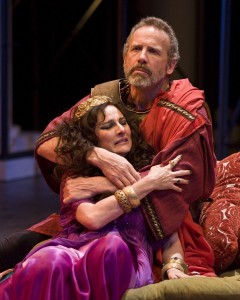 It would seem a real treat, therefore, to see Antony and Cleopatra performed at A Noise Within’s new home in Pasadena. The company has a beautiful, large theatre seating more than the usual 99 or less, a performance space ample enough to stage large battle scenes involving dozens of characters, a modern lighting and sound system and a talented cast. So what could possibly go wrong? While the production is mildly diverting and well-staged, directors Julia Rodriguez-Elliott and Geoff Elliott have distorted Shakespeare’s tragedy into a tragicomedy, turning it into an epic of Fellini-esque proportions. (The comparison is particularly apt at the beginning of the play as cackling laughter continually bombards the ears.)
It would seem a real treat, therefore, to see Antony and Cleopatra performed at A Noise Within’s new home in Pasadena. The company has a beautiful, large theatre seating more than the usual 99 or less, a performance space ample enough to stage large battle scenes involving dozens of characters, a modern lighting and sound system and a talented cast. So what could possibly go wrong? While the production is mildly diverting and well-staged, directors Julia Rodriguez-Elliott and Geoff Elliott have distorted Shakespeare’s tragedy into a tragicomedy, turning it into an epic of Fellini-esque proportions. (The comparison is particularly apt at the beginning of the play as cackling laughter continually bombards the ears.)
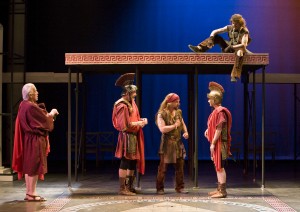
As Shakespeare wrote it, Antony and Cleopatra not only contains the aforementioned tragic elements, but is a story of love and lust gone awry with disastrous consequences for armies and nations. Above all, it tells the story of Cleopatra’s second love, Mark Antony (Julius Caesar was the first), who jointly rules the Roman Empire with Octavius Caesar and Lepidus. When Antony hears of the death of his wife Fulvia, he returns to Rome and helps Caesar and Lepidus defeat the turncoat general Pompey. To cement his renewed bonds with Antony, Caesar offers Antony the hand of his sister Octavia in marriage, after which Antony returns to his beloved Cleopatra in Egypt where he is pursued by Caesar and defeated at the Battle of Actium. Rather than face exile or subservience, both Antony and Cleopatra commit suicide.
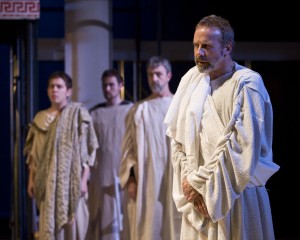 There is nothing particularly comic in Antony and Cleopatra as a whole, though the play undoubtedly has its comic moments, which occasionally serve to lighten the mood. One has only to think of the messenger and his exchanges with Cleopatra. On his first visit, he presents Cleopatra with the bad news of Antony’s marriage to Octavia. For this, he is wrestled to the floor and nearly knifed. On his second visit, he tells Cleopatra exactly what she wants to hear: Antony’s wife Octavia is round-faced, deep-voiced, short in stature, dark-haired, etc. For this, the messenger is rewarded handsomely in gold.
There is nothing particularly comic in Antony and Cleopatra as a whole, though the play undoubtedly has its comic moments, which occasionally serve to lighten the mood. One has only to think of the messenger and his exchanges with Cleopatra. On his first visit, he presents Cleopatra with the bad news of Antony’s marriage to Octavia. For this, he is wrestled to the floor and nearly knifed. On his second visit, he tells Cleopatra exactly what she wants to hear: Antony’s wife Octavia is round-faced, deep-voiced, short in stature, dark-haired, etc. For this, the messenger is rewarded handsomely in gold.
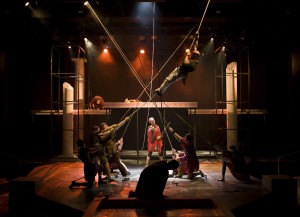 Other scenes, particularly the intimate scenes between Antony and Cleopatra, ring false, as do those between Antony and Caesar. The directors, however, wring every possible laugh out of the script and more, forcing levity where none was likely intended. It gets tiresome hearing Susan Angelo (as Cleopatra) and Geoff Elliott (as Mark Antony) make light of the drama that is their character’s life. Their voices are seldom serious. One wishes to hear a little more ferocity and anguish in their voices as well. The tone does gradually darken as the play wears on, so that one sees a bit of aggression in Antony as he orders Caesar’s messenger to be whipped. Yet it is an aggression born of desperation rather than of being dishonored. Instead of capturing the high-minded pride, honor and imperiousness that are the hallmarks of Greco-Roman rulers, Angelo and Elliott portray the pandering, weak-willed buffoonery of today’s reality TV stars and Republican presidential candidates. This is not, however, the Antony and Cleopatra of history or Shakespeare’s play.
Other scenes, particularly the intimate scenes between Antony and Cleopatra, ring false, as do those between Antony and Caesar. The directors, however, wring every possible laugh out of the script and more, forcing levity where none was likely intended. It gets tiresome hearing Susan Angelo (as Cleopatra) and Geoff Elliott (as Mark Antony) make light of the drama that is their character’s life. Their voices are seldom serious. One wishes to hear a little more ferocity and anguish in their voices as well. The tone does gradually darken as the play wears on, so that one sees a bit of aggression in Antony as he orders Caesar’s messenger to be whipped. Yet it is an aggression born of desperation rather than of being dishonored. Instead of capturing the high-minded pride, honor and imperiousness that are the hallmarks of Greco-Roman rulers, Angelo and Elliott portray the pandering, weak-willed buffoonery of today’s reality TV stars and Republican presidential candidates. This is not, however, the Antony and Cleopatra of history or Shakespeare’s play.
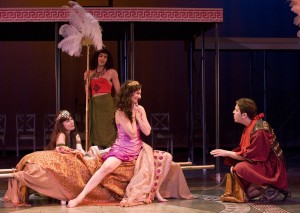 Just as the play as a whole has been ruined by poor direction, so has it been ruined in the details by poor costume design. Costume Designer Angela Calin has created the most ill-fitting togas. To simulate the draped effect, she adds a large piece of fabric that is wrapped around one shoulder, almost like a sash, which is worn by some characters over a long tunic. Lepidus’ tunic is so large and tent-like that it appears as if he really is wearing drapes. Poor research is also revealed in the attire worn by Pompey and his soldiers. Instead of wearing traditional Roman dress – Pompey is a Roman, after all – he is outfitted by Calin to look like a character out of The Pirates of the Caribbean. He wears long hair tied back with a bandana, a beard and knee breeches. The purpose seems to be to associate Pompey with naval strength, since his fleet is renowned, but instead it serves to make Pompey look more like a barbarian. Another oddity is the eunuch’s long hair, make-up and feminine clothing, which makes him look like a transvestite.
Just as the play as a whole has been ruined by poor direction, so has it been ruined in the details by poor costume design. Costume Designer Angela Calin has created the most ill-fitting togas. To simulate the draped effect, she adds a large piece of fabric that is wrapped around one shoulder, almost like a sash, which is worn by some characters over a long tunic. Lepidus’ tunic is so large and tent-like that it appears as if he really is wearing drapes. Poor research is also revealed in the attire worn by Pompey and his soldiers. Instead of wearing traditional Roman dress – Pompey is a Roman, after all – he is outfitted by Calin to look like a character out of The Pirates of the Caribbean. He wears long hair tied back with a bandana, a beard and knee breeches. The purpose seems to be to associate Pompey with naval strength, since his fleet is renowned, but instead it serves to make Pompey look more like a barbarian. Another oddity is the eunuch’s long hair, make-up and feminine clothing, which makes him look like a transvestite.
The strength of A Noise Within’s production of Antony and Cleopatra lies in its staging. Characters move on and off stage from every direction, including the air. Tom Buderwitz’ spare set design is defined by a shallow pool at the forefront and an upper level mid-stage, which neatly divides the space in two. This allows the space behind the upper level to feel like the inside of a building or a ship while that in front feels more like a courtyard. Three moveable pillars also give the impression of a building, although one is used by Pompey as if it were a ship’s mast. The upper level is used in strange, though interesting ways, as when Cleopatra watches from above as her beloved Antony dies; it is the only time she appears on the upper level. More often, it is Caesar who dwells on the upper level, perhaps symbolizing his power and position.
A Noise Within’s Antony and Cleopatra is an entertaining, though flawed, production. Some aspects have clearly been well thought through; others, unfortunately, have not, and these detract from its enjoyment. For a tragedy played like a tragicomedy, there were few laughs. Had it been performed as the tragedy Shakespeare undoubtedly wrote, there might have been tears. Instead, the audience was left puzzled, unsure quite how to react.
photos by Craig Schwartz
Antony and Cleopatra
A Noise Within in Pasadena (Los Angeles Theater)
scheduled to end on May 13
for tickets, visit http://www.anoisewithin.org
